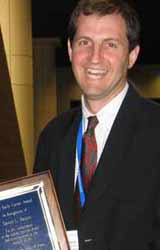The American Psychological Association recently named HLS lecturer Daniel Shapiro the recipient of their Early Career Award, recognizing young scholars who have made significant contributions to research and practice in peace psychology.
As founder and director of Harvard’s International Negotiation Intiative, associate director of the Harvard Negotiation Project and a faculty member of both Harvard Law School and Harvard Medical School, Shapiro has been instrumental in establishing the mission of peace psychology. His course on the emotional dimension of negotiation is one of the most highly rated courses at HLS.
“As I think of who is the most prominent academic in the field of peace psychology, I can think of none to whom I would give a higher recommendation than I now give to Dan,” says Professor Emeritus Roger Fisher, director of the Harvard Negotiation Project.
With funding through the Soros Foundation, Shapiro helped establish a program curriculum to teach former Soviet bloc citizens how to live in an open society. Utilized in over 25 countries, the program is centered around individual self-awareness, communication skills and conflict mangagement tools.
During wars in the former Yugoslavia, Shapiro also conducted conflict management trainings and taught negotiation skills to Serbian parliament members, Middle Eastern negotiators, Macedonian politicans and senior U.S. officials. According to members of the Early Career Award Selection Committee: “Shapiro’s contributions reach a wide range of people including youth, academic, university students, and the general population.”
Shapiro’s most recent publication “Beyond Reason: Using Emotions as you Negotiate,” continues his discovery into the use of peace psychology and emotion during any form of negotiation. It is a follow-up to “Getting to Yes,” the ground-breaking book authored by Fisher in 1981.
